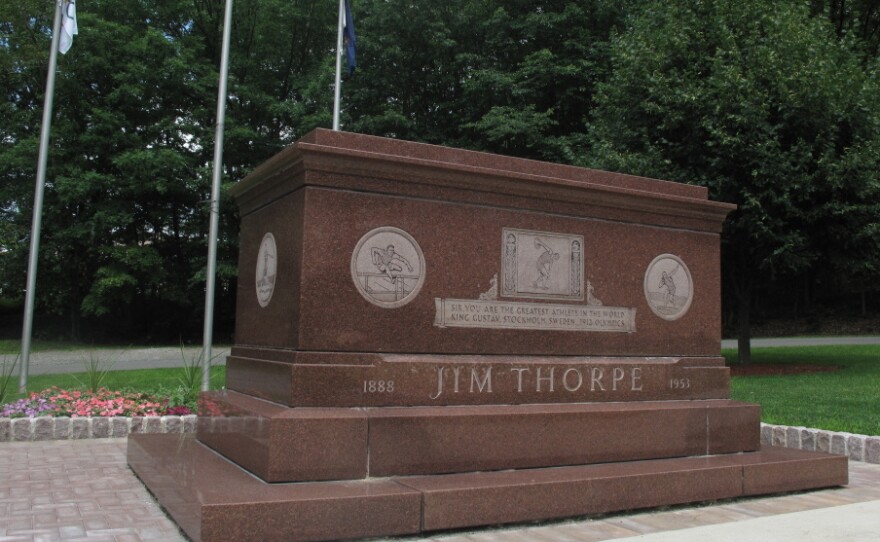More than half a century after the death of sports star Jim Thorpe, his surviving children and a small town in northeastern Pennsylvania are locked in a battle over the Native American athlete's remains.
The two-time Olympic gold medalist, member of the NFL Hall of Fame and former Major League Baseball player was buried in the town of Jim Thorpe, Pa., after he died of a heart attack in 1953.
Now, Thorpe's surviving children and his tribe, the Sac and Fox Nation, are suing the town to bring his body back to his home state of Oklahoma. But town officials want his remains to stay put.
Jim Thorpe, Pa.
Thorpe's body was laid to rest in the town in 1957, but his legacy still lives on in Jim Thorpe, Pa.
"This guy has a whole town named after him," explains Jack Kmetz, president of the Jim Thorpe Area Sports Hall of Fame and lifelong resident of Jim Thorpe, Pa. "He has a bank named after him. He has a post office. He has his own ZIP code."
The local high school is also named after Thorpe, whose achievements at the 1912 Olympics even inspired the school's mascot, the Olympians.
The community of Jim Thorpe ... we have the rights to possession of [Thorpe's] body.
"This is not your average high school varsity letter winner laying here," Kmetz says. "This is an international icon."
An Odd Story
Although Thorpe did attend the Carlisle Indian Industrial School in Pennsylvania, located just 106 miles from Jim Thorpe, Pa., he never visited the town named after him. So how did the Oklahoma native end up buried in the foothills of the Pocono Mountains?
It all started after Thorpe's death, when his widow offered local town officials an unusual deal.
"The community of Jim Thorpe, we have a signed contract by his widow," Kmetz explains. "We have the rights to possession of [Thorpe's] body."
In return, two small neighboring towns consolidated into one, renamed themselves "Jim Thorpe," and agreed to build a public shrine for the famous athlete.

Local residents admit their town's founding makes for an odd story. Both the coal and rail industries had abandoned the area. The arrival of Thorpe's body was seen as a sign of hope for the local economy.
As for Thorpe's widow, she wanted more than just a simple burial for her husband. She wanted a town that would erect a memorial and capitalize on Thorpe's popularity.
A Family Divided
Jim Thorpe's eldest living son, William, from his second marriage, says he never supported his stepmother's plan.
"If your dad turned around and said, 'Hey, I want to be cremated and my ashes put somewhere,' you would abide by it, wouldn't you?" Thorpe says.
Thorpe says he and his brothers have waited for decades to resolve a family dispute over where their father should be buried.
Dad's wish was that he be buried in Oklahoma, and that's what we're trying to accomplish.
"Dad's wish was that he be buried in Oklahoma," Thorpe explains. "And that's what we're trying to accomplish."
In May, Thorpe and his brother Richard, the only two surviving children of Jim Thorpe, joined a lawsuit against the town for possession of their father's remains.
The lawsuit was first filed last year by Jim Thorpe's youngest son, Jack, who died in February.
A Rose-Colored Tomb
A steady stream of cars and motorcycles drives by Jim Thorpe's memorial along Pennsylvania Route 903 in Jim Thorpe, Pa.
Thorpe's rose-colored granite tomb sits on a grassy field, where two larger-than-life bronze statues of Thorpe holding a football and discus also stand guard.
Kmetz stands behind the tomb, surveying the memorial site with the attention of a devoted caretaker. He spots a minivan of out-of-towners turning off the driveway around Thorpe's tomb and driving on the grass.
"That's what you call a lack of respect," Kmetz says with a sigh. "Maybe somebody will drive on their grave one day."
He admits Jim Thorpe has not brought the droves of tourists needed to spur the town's local economy. But, Kmetz says, he has given the town of Jim Thorpe its identity — and a point of pride.
Copyright 2022 NPR. To see more, visit https://www.npr.org. 9(MDAzMjM2NDYzMDEyMzc1Njk5NjAxNzY3OQ001))






